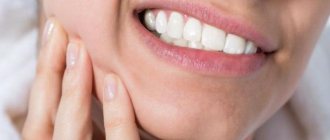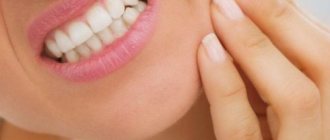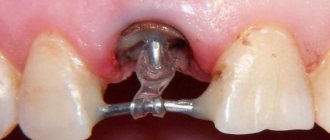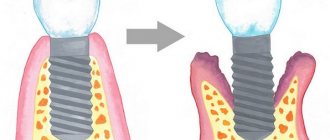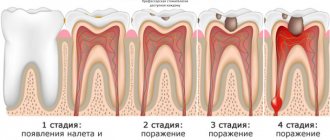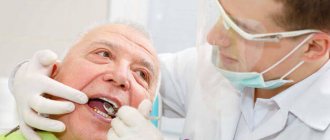Toothache is an unpleasant symptom, which in most cases indicates the development of a pathological process. Sometimes it can be accompanied by fever, and then the question arises: does fever occur with dental caries. We will answer this question in the article.
In this article
- Mechanism of caries development
- What are the symptoms of caries?
- What complications of caries can cause fever?
- Temperature during pulpitis
- Temperature with periodontitis
- The danger of fever due to toothache
- Why does the temperature rise after caries treatment?
Mechanism of caries development
Caries, according to experts, is the most common disease in the world, occurring in more than 90% of the world's population. Despite this, many people have only a superficial knowledge of tooth decay. Therefore, questions often arise about possible symptoms of the disease, in particular, whether the temperature can rise with caries. To understand, let’s first consider what the carious process is. Essentially, this is the slow destruction of a tooth under the influence of various factors, the main ones of which are oral bacteria and carbohydrate foods.
Microbes with cariogenic effects feed on sugars and convert them into acids, which cause destruction of dental tissue. If a person does not remove plaque (colonies of bacteria on teeth) well and at the same time eats a lot of carbohydrates, he creates favorable conditions for the development of caries.
This pathological process in most cases develops gradually. Acids first attack the enamel, then penetrate the dentin, damaging the dental tissues deeper and deeper. If caries is not cured in time and the deep spread of pathology is not stopped, sooner or later caries will develop into pulpitis or periodontitis. These are severe conditions in which the tissues of the pulp (neurovascular bundle) and periodontal tissue (they surround the tooth) become inflamed.
Toothache with fever: see the dentist immediately!
Pain is the main defense mechanism. Pain is created by nature in order to warn us about possible danger, a threat to health. It is toothache that warns us of possible problems. And the stronger the pain, the sooner the help of a dentist is required. The nature of toothache depends on the presence of possible diseases. Toothache can be caused by the beginning of the carious process. But, in this case, it is not permanent and appears when cold, hot, sour or sweet food comes into contact with a sore tooth. Such pain and the possible temperature associated with it can be relieved by thoroughly rinsing the mouth. But then you shouldn’t forget about this problem.
Typically, there are several different causes of toothache. Among them are: - cracks in teeth; — deep fillings made without gasket; — exposure of sensitive dentin at the neck of the tooth; - dental caries with infection entering the tooth cavity.
It is necessary to understand that toothache is a signal to visit a dentist. And timely dental treatment will not only be more effective, but also quite economical.
Most often, the causes of acute toothache can be: - pulpitis; - periodontitis; - tooth abscess.
So, when the carious process begins to affect the medulla of the tooth, pulpitis develops. This disease is characterized by toothaches, which are paroxysmal in nature, especially intense at night, as well as possible fever. So, pain can reach the temple and back of the head, ear, and also spread to neighboring teeth too. If signs characteristic of pulpitis occur, you should contact your dentist. Note that acute toothache can be a sign of periodontitis. With periodontitis, the inflammatory process can spread both to the tooth itself and to the bone tissue around the tips of the roots of the teeth. Periodontitis is, in fact, complicated by caries in which the nerve disintegrates and the ligament that holds the tooth in the jaw is affected. The tooth itself becomes mobile and begins to hurt at the slightest touch. Toothache with periodontitis is clearly localized and often has a pulsating character. Sometimes fever is possible. Toothache with periodontitis increases significantly with mechanical stress on the tooth, especially when pressing on the tooth with a finger or tapping on it. Don't endure until the pain becomes unbearable. Remember that periodontitis is treated promptly. Visiting a doctor immediately after the first signs of the disease appear will make treatment easier and relieve you of pain. The appearance of acute toothache can also be caused by a tooth abscess that occurs as a result of the development of infectious processes in the oral cavity. When a tooth abscesses, a tumor appears, in the area of which acute pain is localized. In principle, toothache can be caused not only by problems in the dental system. It can be determined by diseases of the trigeminal nerve and blood vessels, the temporomandibular joint. But in any case, if a toothache occurs, it is very important not to delay contacting the dentist. Especially if the pain does not go away. So, the patient should immediately consult a dentist, otherwise the cavity of the damaged tooth may become infected. An experienced doctor will quickly relieve you of pain and protect your tooth from damage. The Apollonia dental clinic offers modern methods of prevention and treatment of diseases of the teeth and gums. Trust the professionals and come to the Apollonia clinic. Remember that disease is easier to prevent than to treat. The address and telephone number of the Apollonia dental clinic can be found on the website in the “Contacts” section.
What are the symptoms of caries?
Symptoms of caries directly depend on its stage, that is, on how deep the damage is.
- Spot stage.
The earliest stage of caries development is practically asymptomatic. Nothing bothers the person, there is no hole in the tooth, but the process of demineralization of the enamel has already begun. This is indicated by a small white spot. Of course, at the early stage of caries the temperature does not rise.
- Superficial caries.
This is the stage when a hole appears in the tooth, but it is still concentrated in the enamel area and has not spread to the dentin. The doctor can easily detect a defect in the tooth surface during a visual examination. At this stage, pain may occur in response to irritants (hot or cold, sweet or salty food), and the sensitivity of tooth enamel may increase. Body temperature is normal.
- Average caries.
It is characterized by periodic pain and a carious cavity, which is easy to feel even with the tongue. As in earlier stages, with average caries the temperature does not rise.
- Deep caries.
This is the latest stage of the carious process. The bottom of the carious cavity is located in close proximity to the pulp, the sensitive part of the tooth. Therefore, a person feels acute pain and discomfort while eating. Pain also occurs during a dental examination using a probe. Although deep caries is the most advanced form of the disease, even this stage is not characterized by an increase in temperature.
Thus, with ordinary caries the temperature should not rise. However, complications of an advanced carious process can lead to such a symptom.
Alveolitis sockets
Even after the tooth itself has been removed, problems may arise. But this is normal, the pain may last for two more days after removal. If the operation was complex, the pain will last a week, gradually fading away. When the temperature rises, this indicates that the tooth socket is inflamed due to infection, alveolitis.
The blood clot may break if the rules of conduct during recovery prescribed by the doctor are not followed. Although compliance with all the rules does not guarantee preservation from complications. The latter can occur, for example, in the case of a patient’s reduced immunity or medical errors.
Symptoms of alveolitis: temperature rises to 39; intense pain where the tooth was removed; gray plaque at the site of the hole; putrid odor from the mouth; swelling on the face; lymph nodes are enlarged.
The danger of fever due to toothache
Thus, if toothache and other dental symptoms are accompanied by an increase in temperature, in most cases these are indicators of pulpitis or periodontitis. Without treatment, these diseases can be dangerous because the infection will spread to other organs. Therefore, if an adult or a child’s body temperature rises during toothache, you should immediately consult a doctor.
Otitis media
Fever along with toothache may be due to a disease not related to teeth - otitis media . This is an inflammation in the tympanic cavity; it can be caused by an infectious disease, such as a cold or sore throat.
With otitis media, ear pain appears, hearing decreases, and the temperature rises. It happens that pain from otitis media migrates to the area of both jaws. Therefore, otitis media is perceived by many as just a toothache.
If you experience the problems described above, you should immediately consult a dentist, understand the cause and begin the right treatment!
make an urgent appointment by calling +7
Why does the temperature rise after caries treatment?
Sometimes a slight increase in temperature is observed after treatment of the carious process. Most often this happens in the following cases:
- After a complex invasive procedure, such as root canal cleaning. This is how the body reacts to interference.
- In case of infection (after therapy for purulent periodontitis with a cyst or granuloma). An infectious process can occur due to unprofessional treatment, as well as if the patient does not follow the dentist’s recommendations after the procedure.
- Severe stress. It's no secret that even some adults are afraid to have their teeth treated, and a natural reaction to stress can be an increase in body temperature.
- Sometimes an elevated temperature is nothing more than a symptom of an incipient ARVI, which simply coincided with a visit to the dentist.
If you have a fever after treatment for caries or another dental problem, you should pay attention to your general condition. If you feel normal, if the thermometer does not show above 38°, you can wait a couple of days until the temperature returns to normal. If this does not happen on the third day, you should consult a doctor.
You cannot postpone a visit to the dentist if the temperature is very high (38.5-40 degrees), there is general weakness, headache, inflammation of the lymph nodes, severe pain in the area of the treated tooth, redness and swelling of the gums. Such symptoms may indicate a progressive inflammatory process.
Consumer reviews about Asepta Active mouthwash
julia-06 (irecommend.ru):
“A very good rinse for problem gums.
She had never encountered the problem of bleeding gums, but at her next visit to the dentist she noticed that when she only lightly touched her gums, they began to bleed. So the dentist gave me a mini version of Paradontax toothpaste and advised me to use a mouthwash after brushing my teeth. Mom bought Asepta active mouth rinse.
For some reason I used to be very skeptical about such remedies, but as it turned out, in practice it helps very well. My problem went away completely, my gums stopped bleeding. I don’t even want to read the ingredients and go into its details, it’s unlikely that everything is super natural, but since it helps, I give the mouthwash a solid 5 points. Of course, each case is individual, but I will recommend it based on my experience. And the price of the rinse aid is quite reasonable.”
Ekaterina773 (irecommend.ru):
“I use Asepta mouthwash in combination with toothpaste and gel from the same company. My dentist recommended it to me, and I highly recommend it to you! My gums stopped bleeding after the second use. The mouthwash, unlike the paste, has an astringent effect, and makes the tongue a little numb. It costs around 150 rubles, but exceeds this money 1000 times.”
Sources:
- The role of anti-inflammatory rinse in the treatment of periodontal diseases (L.Yu. Orekhova, A.A. Leontyev, S.B. Ulitovsky) L.Yu. OREKHOVA, Doctor of Medical Sciences, Prof., Head of Department; A.A. LEONTIEV, dentist; S.B. ULITOVSKY, Doctor of Medical Sciences, Prof. Department of Therapeutic Dentistry of St. Petersburg State Medical University named after. acad. I. P. Pavlova
- Report on clinical trials of anti-inflammatory balm for gums "Asepta" adhesive, St. Petersburg State Medical University, 2007
- Report on determining/confirming the preventive properties of commercially produced personal oral hygiene products: Asepta toothpaste used in combination with Asepta mouthwash and Asepta gum balm Head. Department of PFS Doctor of Medical Sciences Professor S.B. Ulitovsky St. Petersburg State Medical University named after Academician I.P. Pavlova. Faculty of Dentistry. Department of Preventive Dentistry.
When is fever considered a complication?
The main sign of pathological fever after installation of a dental implant is an increase in temperature above 37.5–38.0 degrees. Lower values are also abnormal if they last longer than three to five days after surgery and are accompanied by such phenomena as:
- persistent swelling of the mucous membranes, which can spread to facial tissues;
- Increasing pain, difficult to relieve with analgesics or unresponsive to drugs;
- unpleasant odor from the mouth, which can be caused by wound suppuration;
- enlargement of the submandibular lymph nodes is a sign of a developing infection.
The listed symptoms may indicate the onset of a complication, which is usually associated with the development of an acute inflammatory process in the tissues surrounding the artificial root. This pathology is called “peri-implantitis” and requires the fastest possible intervention by a dentist.
Methods for reducing temperature
To reduce fever in young children, you can only use drugs based on paracetomol or ibuprofen in the form of syrups and suppositories. Tablets are not given to children under 3 years of age, as it is difficult to correctly calculate the dosage of the medicine.
When the temperature is high, the child needs to be given water often. Warm water, fruit drinks and compotes without sugar, and children's tea with rose hips are suitable. If the child is breastfeeding, continue breastfeeding as required and supplement between feedings.
The room of a sick child must be regularly ventilated and the air humidity in it must be at least 40%. To do this, you can use humidifiers or at least hang wet towels. The room temperature should not be higher than 18-20 ℃.
Thus:
- Temperature during teething in babies of the first year of life, one year and older is normal if other reasons for its increase are excluded.
- During teething, the temperature lasts an average of 1-3 days.
- Temperatures above 38.5 ℃ should be alarming, since during teething it increases by only half a degree.
- Temperatures above 38.5 ℃ should be brought down. If the child is capricious and does not feel well, then an antipyretic can be given at a lower temperature.
- The temperature of young children is brought down with paracetamol and ibuprofen in the form of syrups and suppositories. The room where the child is located must be regularly ventilated, wet cleaned, and ensure normal humidity and temperature. A sick child should be provided with rest and plenty of warm drinks.
(0 ratings; article rating 0)
Share Share Share
Should you have dental treatment when you have a cold?
There is no definite answer to the question whether it is possible to treat teeth with a cold, because in some situations the pain can be so severe that it is simply impossible to endure it. Many dentists believe that it is not worth treating teeth if you have a cold, but each case is individual, and in each specific situation, a consultation with a specialist is first necessary, at which the doctor will determine whether it is better to postpone the visit or still carry out treatment. Dental treatment during a cold is not recommended for several reasons:
- A cold weakens the body's immune system, which increases the risk of contracting another infection.
- Certain types of dental procedures lead to the appearance of wounds through which infection can spread throughout the body.
From all of the above it follows that it is advisable to postpone dental treatment during a cold, even when the toothache is very severe. Moreover, a cold is most often accompanied by nasal congestion or cough, and you will need to stay in the dental chair with your mouth open for at least 40 minutes. This position during a cold can cause a lot of discomfort.

